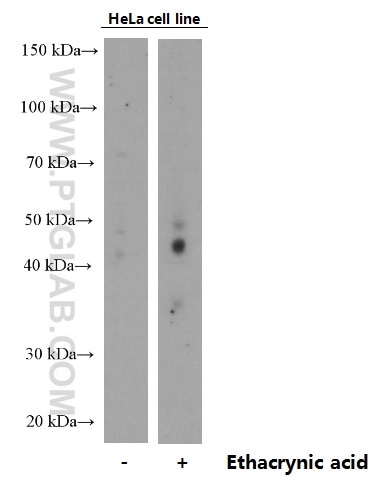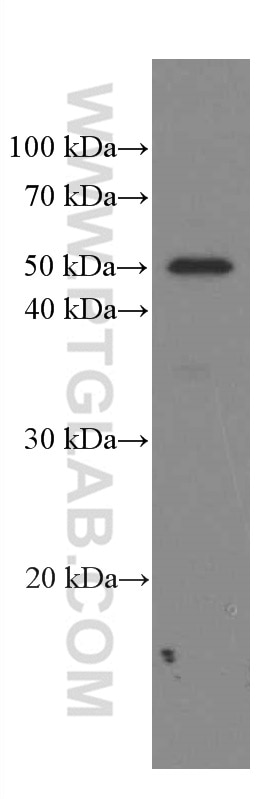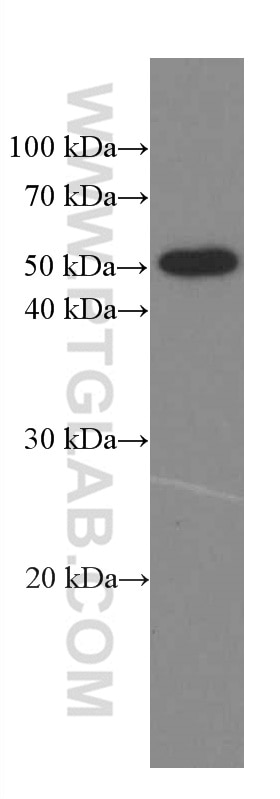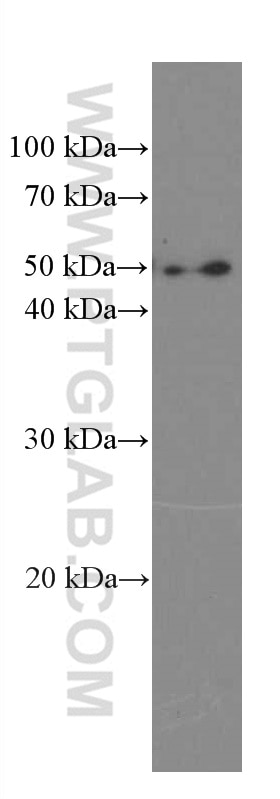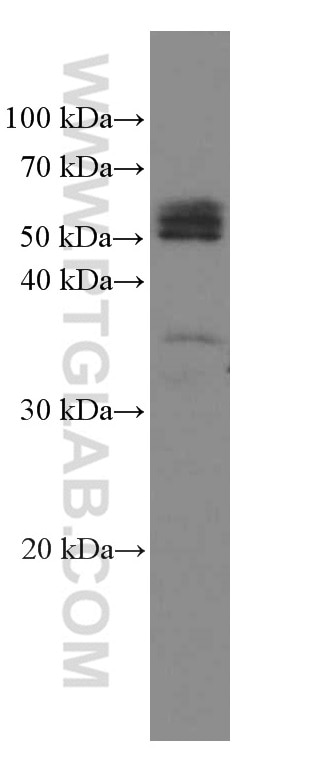Anticorps Monoclonal anti-Phospho-TDP43 (Ser409/410)
Phospho-TDP43 (Ser409/410) Monoclonal Antibody for WB, ELISA
Hôte / Isotype
Mouse / IgG1
Réactivité testée
Humain, rat, souris et plus (1)
Applications
WB, IHC, IF, ELISA
Conjugaison
Non conjugué
CloneNo.
1A2C1
N° de cat : 66318-1-Ig
Synonymes
Galerie de données de validation
Applications testées
| Résultats positifs en WB | cellules HeLa traitées à l'AE, cellules C6, cellules HEK-293, cellules Neuro-2a, tissu placentaire humain |
Dilution recommandée
| Application | Dilution |
|---|---|
| Western Blot (WB) | WB : 1:500-1:2000 |
| It is recommended that this reagent should be titrated in each testing system to obtain optimal results. | |
| Sample-dependent, check data in validation data gallery | |
Applications publiées
| WB | See 9 publications below |
| IHC | See 3 publications below |
| IF | See 8 publications below |
Informations sur le produit
66318-1-Ig cible Phospho-TDP43 (Ser409/410) dans les applications de WB, IHC, IF, ELISA et montre une réactivité avec des échantillons Humain, rat, souris
| Réactivité | Humain, rat, souris |
| Réactivité citée | rat, canin, Humain, souris |
| Hôte / Isotype | Mouse / IgG1 |
| Clonalité | Monoclonal |
| Type | Anticorps |
| Immunogène | Peptide |
| Nom complet | TAR DNA binding protein |
| Masse moléculaire calculée | 43 kDa |
| Poids moléculaire observé | 45-50 kDa, 35 kDa |
| Numéro d’acquisition GenBank | NM_007375 |
| Symbole du gène | TDP-43 |
| Identification du gène (NCBI) | 23435 |
| Conjugaison | Non conjugué |
| Forme | Liquide |
| Méthode de purification | Purification par protéine G |
| Tampon de stockage | PBS with 0.02% sodium azide and 50% glycerol |
| Conditions de stockage | Stocker à -20°C. Stable pendant un an après l'expédition. L'aliquotage n'est pas nécessaire pour le stockage à -20oC Les 20ul contiennent 0,1% de BSA. |
Informations générales
The TARDBP gene encodes the TDP-43 protein, initially found to repress HIV-1 transcription by binding TAR DNA. TDP-43 has since been shown to bind RNA as well as DNA, and have multiple functions in transcriptional repression, translational regulation and pre-mRNA splicing. For instance, it is reported to regulate alternate splicing of the CTFR gene. In 2006 Neumann et al. found that hyperphosphorylated, ubiquitinated and/or cleaved forms of TDP-43, collectively known as pathological TDP-43, play a major role in the disease mechanisms of ubiquitin-positive, tau- and alpha-synuclein-negative frontotemporal dementia (FTLD-U) and in amyotrophic lateral sclerosis (ALS). Various forms of TDP-43 exist, including 18-35 kDa of cleaved C-terminal fragments, 45-50 kDa phospho-protein, 55 kDa glycosylated form, 75 kDa hyperphosphorylated form, and 90-300 kDa cross-linked form. (PMID: 17023659,19823856, 21666678, 22193176). 66318-1-Ig is a phospho-dependent monoclonal antibody specifically recognizing phospho-TDP43 (409/410). It does not react with native TDP-43.
Protocole
| Product Specific Protocols | |
|---|---|
| WB protocol for Phospho-TDP43 (Ser409/410) antibody 66318-1-Ig | Download protocol |
| Standard Protocols | |
|---|---|
| Click here to view our Standard Protocols |
Publications
| Species | Application | Title |
|---|---|---|
Nat Cell Biol Caspase-2 is a condensate-mediated deubiquitinase in protein quality control | ||
Mol Cell Stress Induces Dynamic, Cytotoxicity-Antagonizing TDP-43 Nuclear Bodies via Paraspeckle LncRNA NEAT1-Mediated Liquid-Liquid Phase Separation. | ||
Acta Neuropathol Commun Ex vivo MRI atlas of the human medial temporal lobe: characterizing neurodegeneration due to tau pathology. | ||
PLoS Genet Progressive ataxia of Charolais cattle highlights a role of KIF1C in sustainable myelination. | ||
Eur J Neurol SOD1 p.D12Y variant is associated with amyotrophic lateral sclerosis/distal myopathy spectrum. | ||
Neuroimage Clin Ex vivo MRI and histopathology detect novel iron-rich cortical inflammation in frontotemporal lobar degeneration with tau versus TDP-43 pathology. |
Avis
The reviews below have been submitted by verified Proteintech customers who received an incentive for providing their feedback.
FH Emilie (Verified Customer) (09-24-2025) | I tried it in Western blot (1:1000) and immunofluorescence (1:200), and it gave reliable results.
|
FH Manon (Verified Customer) (09-23-2025) | The antibody shows very nice staining by IF and also works well by WB
|
FH Alejandro (Verified Customer) (04-08-2020) | Good product
|
